Leadership: Importance of Leadership Coaching and Role Efficacy
VerifiedAdded on 2023/06/11
|10
|2770
|210
AI Summary
This study explores the impact of leadership coaching on role efficacy and its significance in mobilizing resources and executing tasks. The study's findings suggest that leadership coaching is a promising leadership development practice. The report provides suitable criteria for the effectiveness of leadership coaching and its application across organizations. The study's implications for leadership theory and development are discussed.
Contribute Materials
Your contribution can guide someone’s learning journey. Share your
documents today.

Running head: LEADERSHIP
Leadership
Name of Student:
Name of University:
Author’s Note:
Leadership
Name of Student:
Name of University:
Author’s Note:
Secure Best Marks with AI Grader
Need help grading? Try our AI Grader for instant feedback on your assignments.
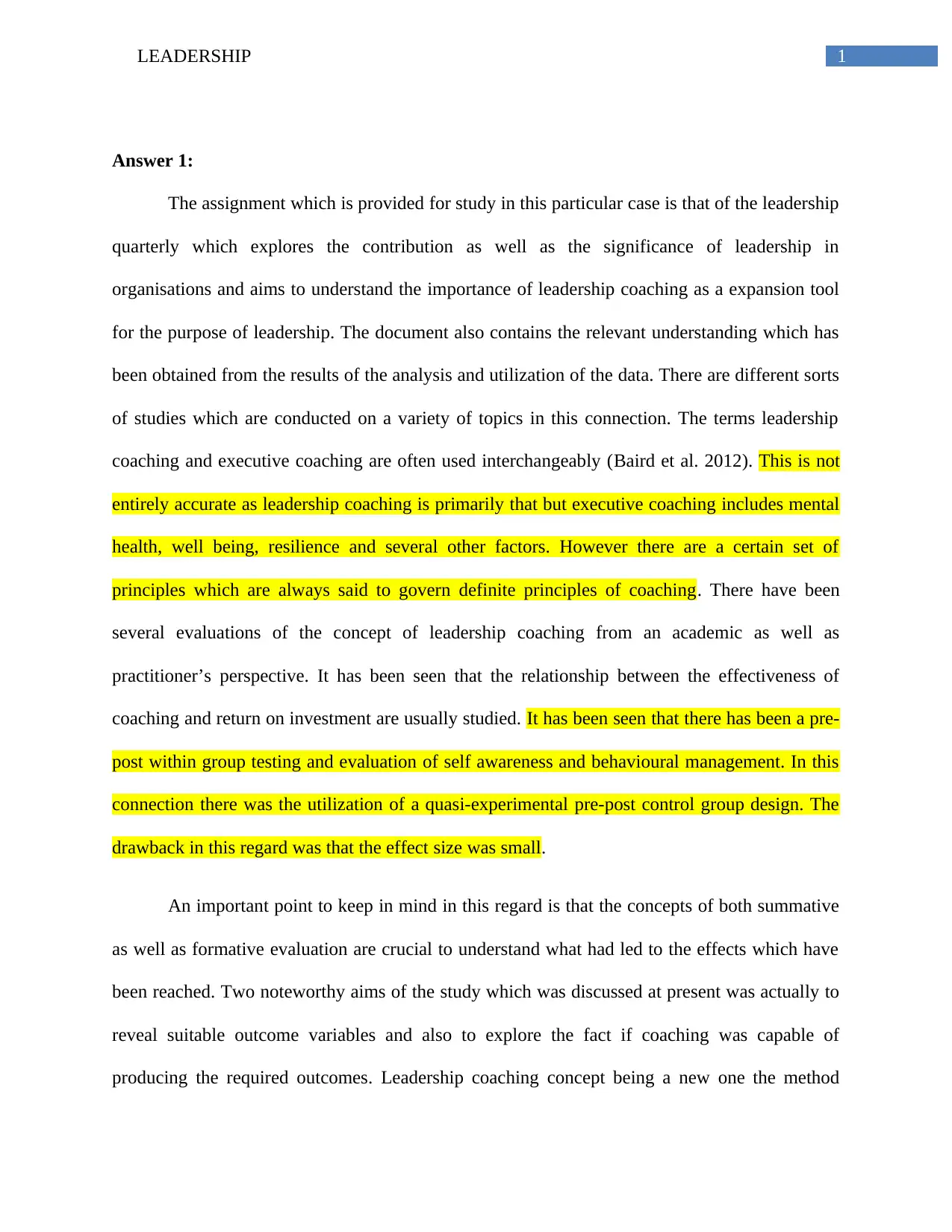
1LEADERSHIP
Answer 1:
The assignment which is provided for study in this particular case is that of the leadership
quarterly which explores the contribution as well as the significance of leadership in
organisations and aims to understand the importance of leadership coaching as a expansion tool
for the purpose of leadership. The document also contains the relevant understanding which has
been obtained from the results of the analysis and utilization of the data. There are different sorts
of studies which are conducted on a variety of topics in this connection. The terms leadership
coaching and executive coaching are often used interchangeably (Baird et al. 2012). This is not
entirely accurate as leadership coaching is primarily that but executive coaching includes mental
health, well being, resilience and several other factors. However there are a certain set of
principles which are always said to govern definite principles of coaching. There have been
several evaluations of the concept of leadership coaching from an academic as well as
practitioner’s perspective. It has been seen that the relationship between the effectiveness of
coaching and return on investment are usually studied. It has been seen that there has been a pre-
post within group testing and evaluation of self awareness and behavioural management. In this
connection there was the utilization of a quasi-experimental pre-post control group design. The
drawback in this regard was that the effect size was small.
An important point to keep in mind in this regard is that the concepts of both summative
as well as formative evaluation are crucial to understand what had led to the effects which have
been reached. Two noteworthy aims of the study which was discussed at present was actually to
reveal suitable outcome variables and also to explore the fact if coaching was capable of
producing the required outcomes. Leadership coaching concept being a new one the method
Answer 1:
The assignment which is provided for study in this particular case is that of the leadership
quarterly which explores the contribution as well as the significance of leadership in
organisations and aims to understand the importance of leadership coaching as a expansion tool
for the purpose of leadership. The document also contains the relevant understanding which has
been obtained from the results of the analysis and utilization of the data. There are different sorts
of studies which are conducted on a variety of topics in this connection. The terms leadership
coaching and executive coaching are often used interchangeably (Baird et al. 2012). This is not
entirely accurate as leadership coaching is primarily that but executive coaching includes mental
health, well being, resilience and several other factors. However there are a certain set of
principles which are always said to govern definite principles of coaching. There have been
several evaluations of the concept of leadership coaching from an academic as well as
practitioner’s perspective. It has been seen that the relationship between the effectiveness of
coaching and return on investment are usually studied. It has been seen that there has been a pre-
post within group testing and evaluation of self awareness and behavioural management. In this
connection there was the utilization of a quasi-experimental pre-post control group design. The
drawback in this regard was that the effect size was small.
An important point to keep in mind in this regard is that the concepts of both summative
as well as formative evaluation are crucial to understand what had led to the effects which have
been reached. Two noteworthy aims of the study which was discussed at present was actually to
reveal suitable outcome variables and also to explore the fact if coaching was capable of
producing the required outcomes. Leadership coaching concept being a new one the method
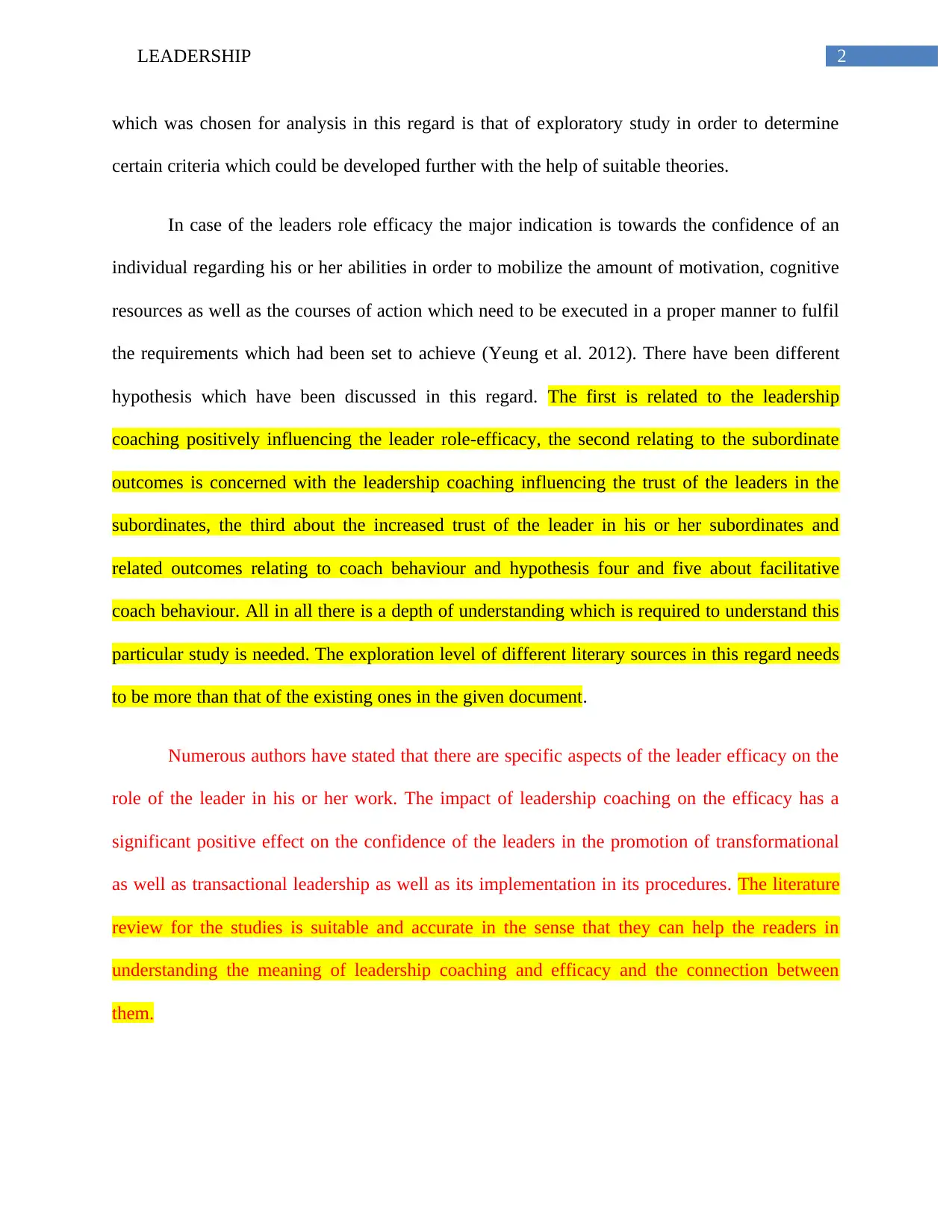
2LEADERSHIP
which was chosen for analysis in this regard is that of exploratory study in order to determine
certain criteria which could be developed further with the help of suitable theories.
In case of the leaders role efficacy the major indication is towards the confidence of an
individual regarding his or her abilities in order to mobilize the amount of motivation, cognitive
resources as well as the courses of action which need to be executed in a proper manner to fulfil
the requirements which had been set to achieve (Yeung et al. 2012). There have been different
hypothesis which have been discussed in this regard. The first is related to the leadership
coaching positively influencing the leader role-efficacy, the second relating to the subordinate
outcomes is concerned with the leadership coaching influencing the trust of the leaders in the
subordinates, the third about the increased trust of the leader in his or her subordinates and
related outcomes relating to coach behaviour and hypothesis four and five about facilitative
coach behaviour. All in all there is a depth of understanding which is required to understand this
particular study is needed. The exploration level of different literary sources in this regard needs
to be more than that of the existing ones in the given document.
Numerous authors have stated that there are specific aspects of the leader efficacy on the
role of the leader in his or her work. The impact of leadership coaching on the efficacy has a
significant positive effect on the confidence of the leaders in the promotion of transformational
as well as transactional leadership as well as its implementation in its procedures. The literature
review for the studies is suitable and accurate in the sense that they can help the readers in
understanding the meaning of leadership coaching and efficacy and the connection between
them.
which was chosen for analysis in this regard is that of exploratory study in order to determine
certain criteria which could be developed further with the help of suitable theories.
In case of the leaders role efficacy the major indication is towards the confidence of an
individual regarding his or her abilities in order to mobilize the amount of motivation, cognitive
resources as well as the courses of action which need to be executed in a proper manner to fulfil
the requirements which had been set to achieve (Yeung et al. 2012). There have been different
hypothesis which have been discussed in this regard. The first is related to the leadership
coaching positively influencing the leader role-efficacy, the second relating to the subordinate
outcomes is concerned with the leadership coaching influencing the trust of the leaders in the
subordinates, the third about the increased trust of the leader in his or her subordinates and
related outcomes relating to coach behaviour and hypothesis four and five about facilitative
coach behaviour. All in all there is a depth of understanding which is required to understand this
particular study is needed. The exploration level of different literary sources in this regard needs
to be more than that of the existing ones in the given document.
Numerous authors have stated that there are specific aspects of the leader efficacy on the
role of the leader in his or her work. The impact of leadership coaching on the efficacy has a
significant positive effect on the confidence of the leaders in the promotion of transformational
as well as transactional leadership as well as its implementation in its procedures. The literature
review for the studies is suitable and accurate in the sense that they can help the readers in
understanding the meaning of leadership coaching and efficacy and the connection between
them.
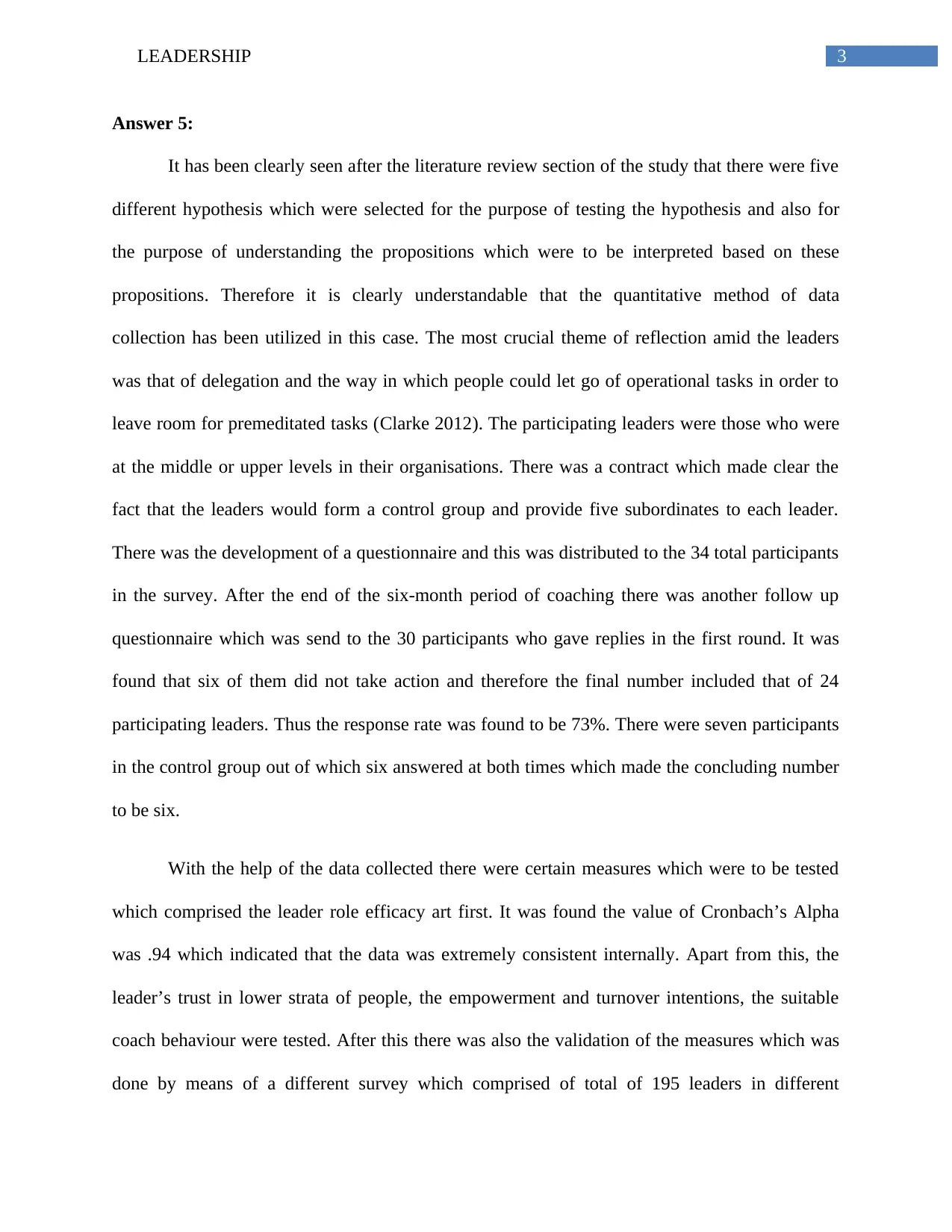
3LEADERSHIP
Answer 5:
It has been clearly seen after the literature review section of the study that there were five
different hypothesis which were selected for the purpose of testing the hypothesis and also for
the purpose of understanding the propositions which were to be interpreted based on these
propositions. Therefore it is clearly understandable that the quantitative method of data
collection has been utilized in this case. The most crucial theme of reflection amid the leaders
was that of delegation and the way in which people could let go of operational tasks in order to
leave room for premeditated tasks (Clarke 2012). The participating leaders were those who were
at the middle or upper levels in their organisations. There was a contract which made clear the
fact that the leaders would form a control group and provide five subordinates to each leader.
There was the development of a questionnaire and this was distributed to the 34 total participants
in the survey. After the end of the six-month period of coaching there was another follow up
questionnaire which was send to the 30 participants who gave replies in the first round. It was
found that six of them did not take action and therefore the final number included that of 24
participating leaders. Thus the response rate was found to be 73%. There were seven participants
in the control group out of which six answered at both times which made the concluding number
to be six.
With the help of the data collected there were certain measures which were to be tested
which comprised the leader role efficacy art first. It was found the value of Cronbach’s Alpha
was .94 which indicated that the data was extremely consistent internally. Apart from this, the
leader’s trust in lower strata of people, the empowerment and turnover intentions, the suitable
coach behaviour were tested. After this there was also the validation of the measures which was
done by means of a different survey which comprised of total of 195 leaders in different
Answer 5:
It has been clearly seen after the literature review section of the study that there were five
different hypothesis which were selected for the purpose of testing the hypothesis and also for
the purpose of understanding the propositions which were to be interpreted based on these
propositions. Therefore it is clearly understandable that the quantitative method of data
collection has been utilized in this case. The most crucial theme of reflection amid the leaders
was that of delegation and the way in which people could let go of operational tasks in order to
leave room for premeditated tasks (Clarke 2012). The participating leaders were those who were
at the middle or upper levels in their organisations. There was a contract which made clear the
fact that the leaders would form a control group and provide five subordinates to each leader.
There was the development of a questionnaire and this was distributed to the 34 total participants
in the survey. After the end of the six-month period of coaching there was another follow up
questionnaire which was send to the 30 participants who gave replies in the first round. It was
found that six of them did not take action and therefore the final number included that of 24
participating leaders. Thus the response rate was found to be 73%. There were seven participants
in the control group out of which six answered at both times which made the concluding number
to be six.
With the help of the data collected there were certain measures which were to be tested
which comprised the leader role efficacy art first. It was found the value of Cronbach’s Alpha
was .94 which indicated that the data was extremely consistent internally. Apart from this, the
leader’s trust in lower strata of people, the empowerment and turnover intentions, the suitable
coach behaviour were tested. After this there was also the validation of the measures which was
done by means of a different survey which comprised of total of 195 leaders in different
Secure Best Marks with AI Grader
Need help grading? Try our AI Grader for instant feedback on your assignments.
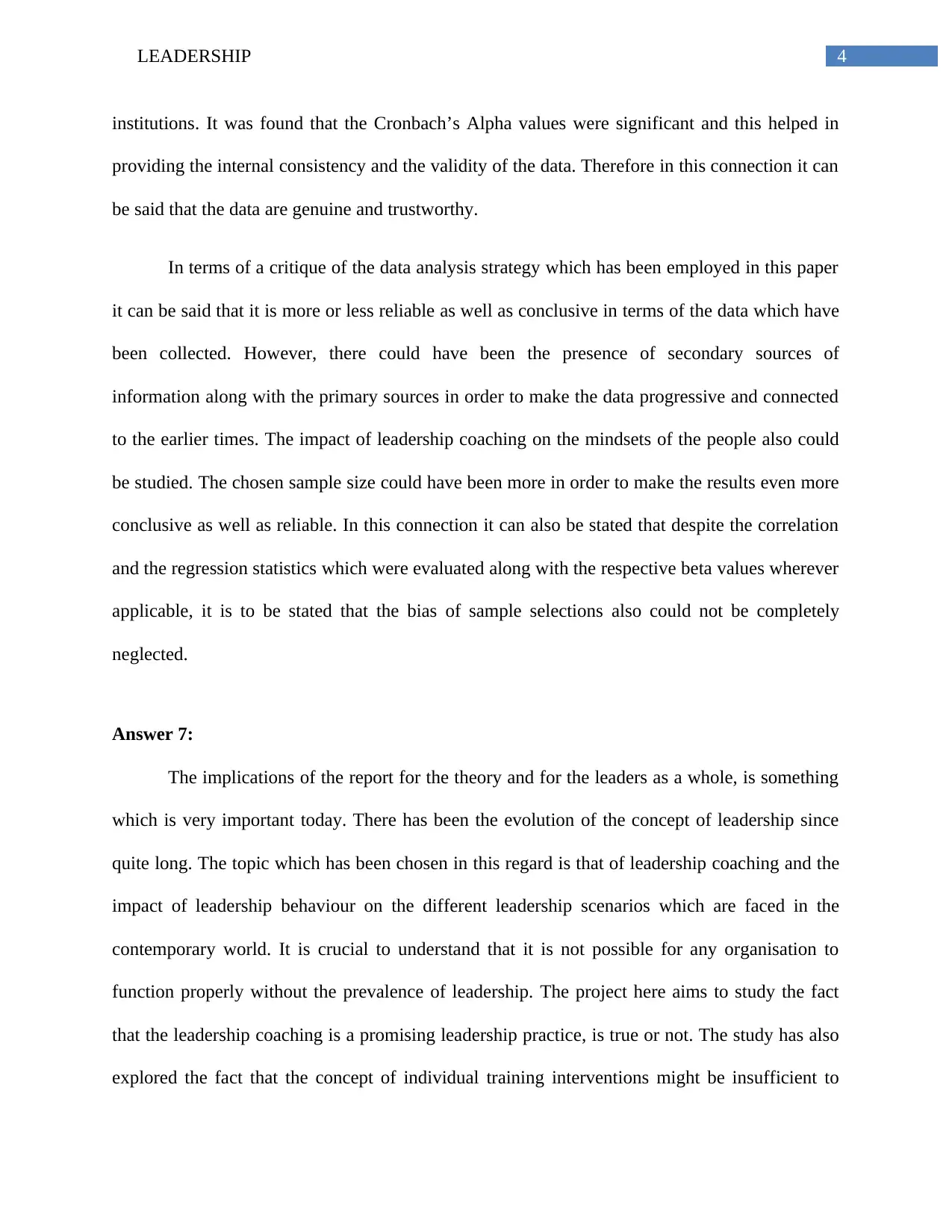
4LEADERSHIP
institutions. It was found that the Cronbach’s Alpha values were significant and this helped in
providing the internal consistency and the validity of the data. Therefore in this connection it can
be said that the data are genuine and trustworthy.
In terms of a critique of the data analysis strategy which has been employed in this paper
it can be said that it is more or less reliable as well as conclusive in terms of the data which have
been collected. However, there could have been the presence of secondary sources of
information along with the primary sources in order to make the data progressive and connected
to the earlier times. The impact of leadership coaching on the mindsets of the people also could
be studied. The chosen sample size could have been more in order to make the results even more
conclusive as well as reliable. In this connection it can also be stated that despite the correlation
and the regression statistics which were evaluated along with the respective beta values wherever
applicable, it is to be stated that the bias of sample selections also could not be completely
neglected.
Answer 7:
The implications of the report for the theory and for the leaders as a whole, is something
which is very important today. There has been the evolution of the concept of leadership since
quite long. The topic which has been chosen in this regard is that of leadership coaching and the
impact of leadership behaviour on the different leadership scenarios which are faced in the
contemporary world. It is crucial to understand that it is not possible for any organisation to
function properly without the prevalence of leadership. The project here aims to study the fact
that the leadership coaching is a promising leadership practice, is true or not. The study has also
explored the fact that the concept of individual training interventions might be insufficient to
institutions. It was found that the Cronbach’s Alpha values were significant and this helped in
providing the internal consistency and the validity of the data. Therefore in this connection it can
be said that the data are genuine and trustworthy.
In terms of a critique of the data analysis strategy which has been employed in this paper
it can be said that it is more or less reliable as well as conclusive in terms of the data which have
been collected. However, there could have been the presence of secondary sources of
information along with the primary sources in order to make the data progressive and connected
to the earlier times. The impact of leadership coaching on the mindsets of the people also could
be studied. The chosen sample size could have been more in order to make the results even more
conclusive as well as reliable. In this connection it can also be stated that despite the correlation
and the regression statistics which were evaluated along with the respective beta values wherever
applicable, it is to be stated that the bias of sample selections also could not be completely
neglected.
Answer 7:
The implications of the report for the theory and for the leaders as a whole, is something
which is very important today. There has been the evolution of the concept of leadership since
quite long. The topic which has been chosen in this regard is that of leadership coaching and the
impact of leadership behaviour on the different leadership scenarios which are faced in the
contemporary world. It is crucial to understand that it is not possible for any organisation to
function properly without the prevalence of leadership. The project here aims to study the fact
that the leadership coaching is a promising leadership practice, is true or not. The study has also
explored the fact that the concept of individual training interventions might be insufficient to
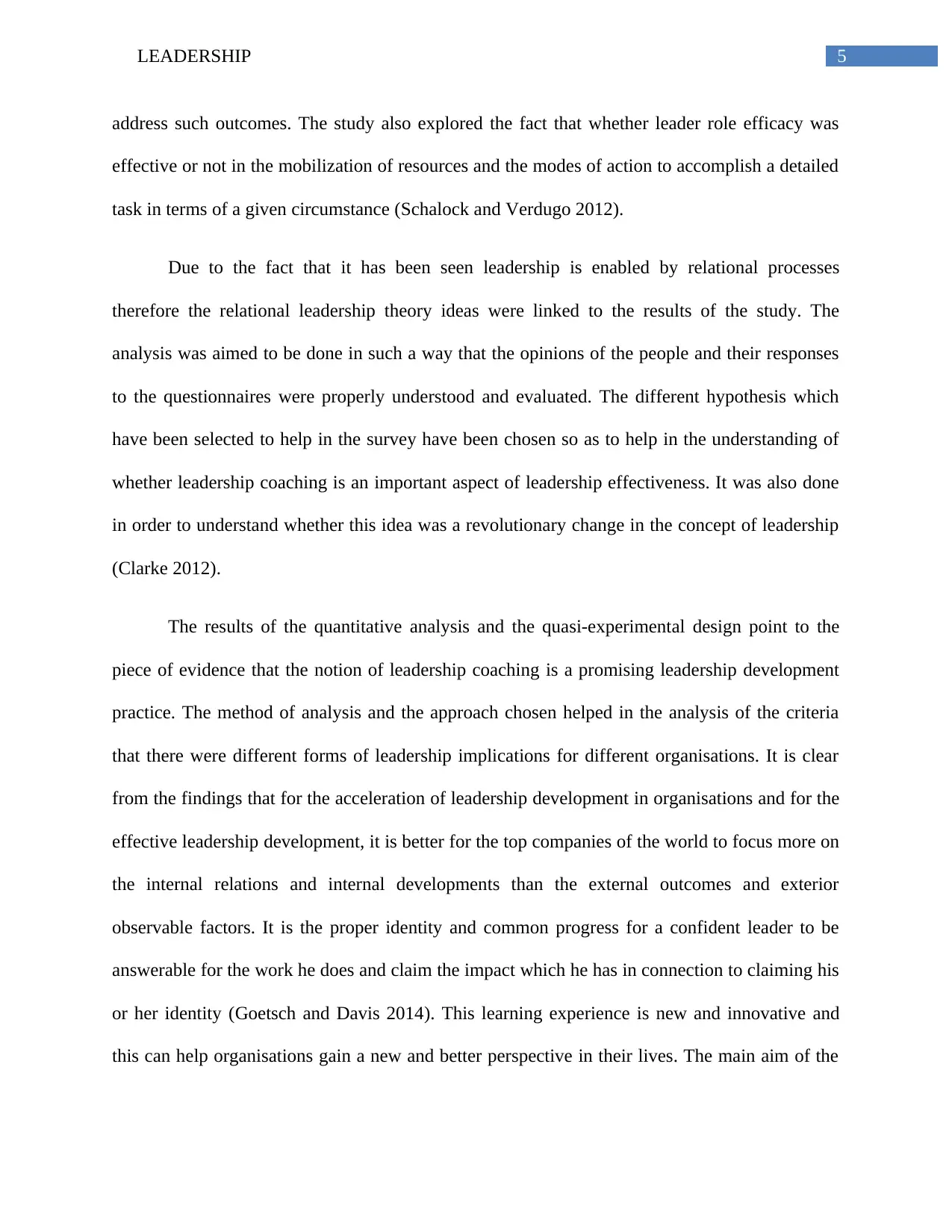
5LEADERSHIP
address such outcomes. The study also explored the fact that whether leader role efficacy was
effective or not in the mobilization of resources and the modes of action to accomplish a detailed
task in terms of a given circumstance (Schalock and Verdugo 2012).
Due to the fact that it has been seen leadership is enabled by relational processes
therefore the relational leadership theory ideas were linked to the results of the study. The
analysis was aimed to be done in such a way that the opinions of the people and their responses
to the questionnaires were properly understood and evaluated. The different hypothesis which
have been selected to help in the survey have been chosen so as to help in the understanding of
whether leadership coaching is an important aspect of leadership effectiveness. It was also done
in order to understand whether this idea was a revolutionary change in the concept of leadership
(Clarke 2012).
The results of the quantitative analysis and the quasi-experimental design point to the
piece of evidence that the notion of leadership coaching is a promising leadership development
practice. The method of analysis and the approach chosen helped in the analysis of the criteria
that there were different forms of leadership implications for different organisations. It is clear
from the findings that for the acceleration of leadership development in organisations and for the
effective leadership development, it is better for the top companies of the world to focus more on
the internal relations and internal developments than the external outcomes and exterior
observable factors. It is the proper identity and common progress for a confident leader to be
answerable for the work he does and claim the impact which he has in connection to claiming his
or her identity (Goetsch and Davis 2014). This learning experience is new and innovative and
this can help organisations gain a new and better perspective in their lives. The main aim of the
address such outcomes. The study also explored the fact that whether leader role efficacy was
effective or not in the mobilization of resources and the modes of action to accomplish a detailed
task in terms of a given circumstance (Schalock and Verdugo 2012).
Due to the fact that it has been seen leadership is enabled by relational processes
therefore the relational leadership theory ideas were linked to the results of the study. The
analysis was aimed to be done in such a way that the opinions of the people and their responses
to the questionnaires were properly understood and evaluated. The different hypothesis which
have been selected to help in the survey have been chosen so as to help in the understanding of
whether leadership coaching is an important aspect of leadership effectiveness. It was also done
in order to understand whether this idea was a revolutionary change in the concept of leadership
(Clarke 2012).
The results of the quantitative analysis and the quasi-experimental design point to the
piece of evidence that the notion of leadership coaching is a promising leadership development
practice. The method of analysis and the approach chosen helped in the analysis of the criteria
that there were different forms of leadership implications for different organisations. It is clear
from the findings that for the acceleration of leadership development in organisations and for the
effective leadership development, it is better for the top companies of the world to focus more on
the internal relations and internal developments than the external outcomes and exterior
observable factors. It is the proper identity and common progress for a confident leader to be
answerable for the work he does and claim the impact which he has in connection to claiming his
or her identity (Goetsch and Davis 2014). This learning experience is new and innovative and
this can help organisations gain a new and better perspective in their lives. The main aim of the
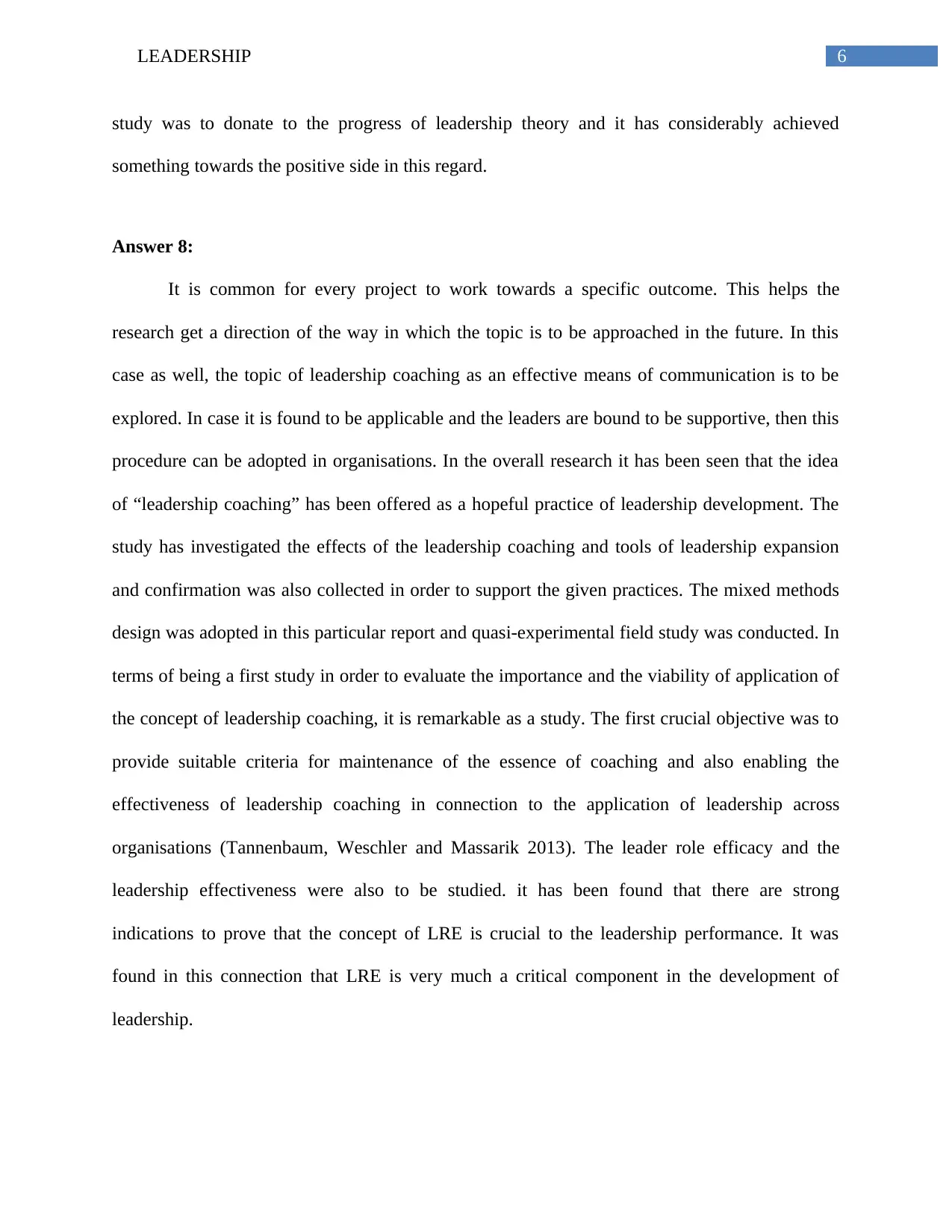
6LEADERSHIP
study was to donate to the progress of leadership theory and it has considerably achieved
something towards the positive side in this regard.
Answer 8:
It is common for every project to work towards a specific outcome. This helps the
research get a direction of the way in which the topic is to be approached in the future. In this
case as well, the topic of leadership coaching as an effective means of communication is to be
explored. In case it is found to be applicable and the leaders are bound to be supportive, then this
procedure can be adopted in organisations. In the overall research it has been seen that the idea
of “leadership coaching” has been offered as a hopeful practice of leadership development. The
study has investigated the effects of the leadership coaching and tools of leadership expansion
and confirmation was also collected in order to support the given practices. The mixed methods
design was adopted in this particular report and quasi-experimental field study was conducted. In
terms of being a first study in order to evaluate the importance and the viability of application of
the concept of leadership coaching, it is remarkable as a study. The first crucial objective was to
provide suitable criteria for maintenance of the essence of coaching and also enabling the
effectiveness of leadership coaching in connection to the application of leadership across
organisations (Tannenbaum, Weschler and Massarik 2013). The leader role efficacy and the
leadership effectiveness were also to be studied. it has been found that there are strong
indications to prove that the concept of LRE is crucial to the leadership performance. It was
found in this connection that LRE is very much a critical component in the development of
leadership.
study was to donate to the progress of leadership theory and it has considerably achieved
something towards the positive side in this regard.
Answer 8:
It is common for every project to work towards a specific outcome. This helps the
research get a direction of the way in which the topic is to be approached in the future. In this
case as well, the topic of leadership coaching as an effective means of communication is to be
explored. In case it is found to be applicable and the leaders are bound to be supportive, then this
procedure can be adopted in organisations. In the overall research it has been seen that the idea
of “leadership coaching” has been offered as a hopeful practice of leadership development. The
study has investigated the effects of the leadership coaching and tools of leadership expansion
and confirmation was also collected in order to support the given practices. The mixed methods
design was adopted in this particular report and quasi-experimental field study was conducted. In
terms of being a first study in order to evaluate the importance and the viability of application of
the concept of leadership coaching, it is remarkable as a study. The first crucial objective was to
provide suitable criteria for maintenance of the essence of coaching and also enabling the
effectiveness of leadership coaching in connection to the application of leadership across
organisations (Tannenbaum, Weschler and Massarik 2013). The leader role efficacy and the
leadership effectiveness were also to be studied. it has been found that there are strong
indications to prove that the concept of LRE is crucial to the leadership performance. It was
found in this connection that LRE is very much a critical component in the development of
leadership.
Paraphrase This Document
Need a fresh take? Get an instant paraphrase of this document with our AI Paraphraser
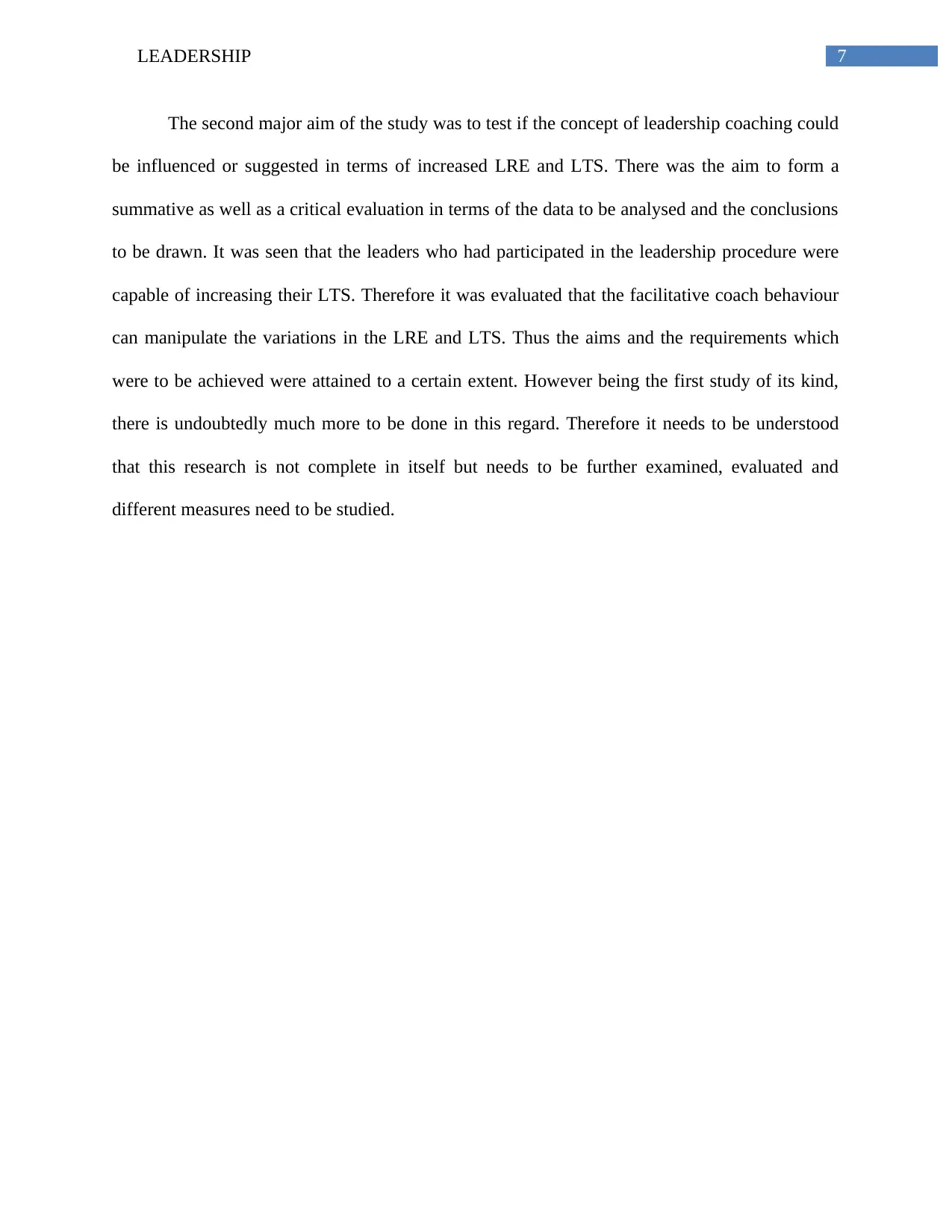
7LEADERSHIP
The second major aim of the study was to test if the concept of leadership coaching could
be influenced or suggested in terms of increased LRE and LTS. There was the aim to form a
summative as well as a critical evaluation in terms of the data to be analysed and the conclusions
to be drawn. It was seen that the leaders who had participated in the leadership procedure were
capable of increasing their LTS. Therefore it was evaluated that the facilitative coach behaviour
can manipulate the variations in the LRE and LTS. Thus the aims and the requirements which
were to be achieved were attained to a certain extent. However being the first study of its kind,
there is undoubtedly much more to be done in this regard. Therefore it needs to be understood
that this research is not complete in itself but needs to be further examined, evaluated and
different measures need to be studied.
The second major aim of the study was to test if the concept of leadership coaching could
be influenced or suggested in terms of increased LRE and LTS. There was the aim to form a
summative as well as a critical evaluation in terms of the data to be analysed and the conclusions
to be drawn. It was seen that the leaders who had participated in the leadership procedure were
capable of increasing their LTS. Therefore it was evaluated that the facilitative coach behaviour
can manipulate the variations in the LRE and LTS. Thus the aims and the requirements which
were to be achieved were attained to a certain extent. However being the first study of its kind,
there is undoubtedly much more to be done in this regard. Therefore it needs to be understood
that this research is not complete in itself but needs to be further examined, evaluated and
different measures need to be studied.
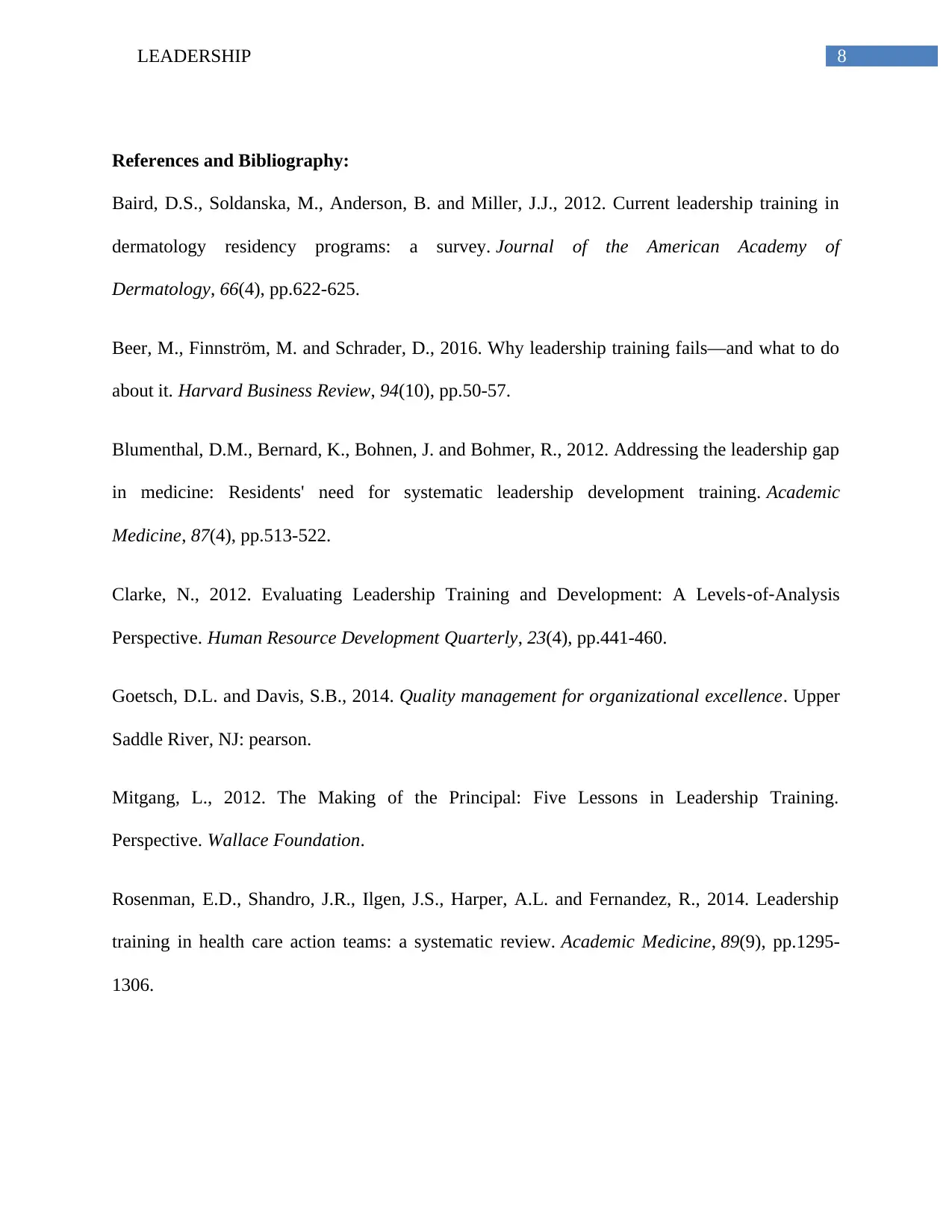
8LEADERSHIP
References and Bibliography:
Baird, D.S., Soldanska, M., Anderson, B. and Miller, J.J., 2012. Current leadership training in
dermatology residency programs: a survey. Journal of the American Academy of
Dermatology, 66(4), pp.622-625.
Beer, M., Finnström, M. and Schrader, D., 2016. Why leadership training fails—and what to do
about it. Harvard Business Review, 94(10), pp.50-57.
Blumenthal, D.M., Bernard, K., Bohnen, J. and Bohmer, R., 2012. Addressing the leadership gap
in medicine: Residents' need for systematic leadership development training. Academic
Medicine, 87(4), pp.513-522.
Clarke, N., 2012. Evaluating Leadership Training and Development: A Levels‐of‐Analysis
Perspective. Human Resource Development Quarterly, 23(4), pp.441-460.
Goetsch, D.L. and Davis, S.B., 2014. Quality management for organizational excellence. Upper
Saddle River, NJ: pearson.
Mitgang, L., 2012. The Making of the Principal: Five Lessons in Leadership Training.
Perspective. Wallace Foundation.
Rosenman, E.D., Shandro, J.R., Ilgen, J.S., Harper, A.L. and Fernandez, R., 2014. Leadership
training in health care action teams: a systematic review. Academic Medicine, 89(9), pp.1295-
1306.
References and Bibliography:
Baird, D.S., Soldanska, M., Anderson, B. and Miller, J.J., 2012. Current leadership training in
dermatology residency programs: a survey. Journal of the American Academy of
Dermatology, 66(4), pp.622-625.
Beer, M., Finnström, M. and Schrader, D., 2016. Why leadership training fails—and what to do
about it. Harvard Business Review, 94(10), pp.50-57.
Blumenthal, D.M., Bernard, K., Bohnen, J. and Bohmer, R., 2012. Addressing the leadership gap
in medicine: Residents' need for systematic leadership development training. Academic
Medicine, 87(4), pp.513-522.
Clarke, N., 2012. Evaluating Leadership Training and Development: A Levels‐of‐Analysis
Perspective. Human Resource Development Quarterly, 23(4), pp.441-460.
Goetsch, D.L. and Davis, S.B., 2014. Quality management for organizational excellence. Upper
Saddle River, NJ: pearson.
Mitgang, L., 2012. The Making of the Principal: Five Lessons in Leadership Training.
Perspective. Wallace Foundation.
Rosenman, E.D., Shandro, J.R., Ilgen, J.S., Harper, A.L. and Fernandez, R., 2014. Leadership
training in health care action teams: a systematic review. Academic Medicine, 89(9), pp.1295-
1306.
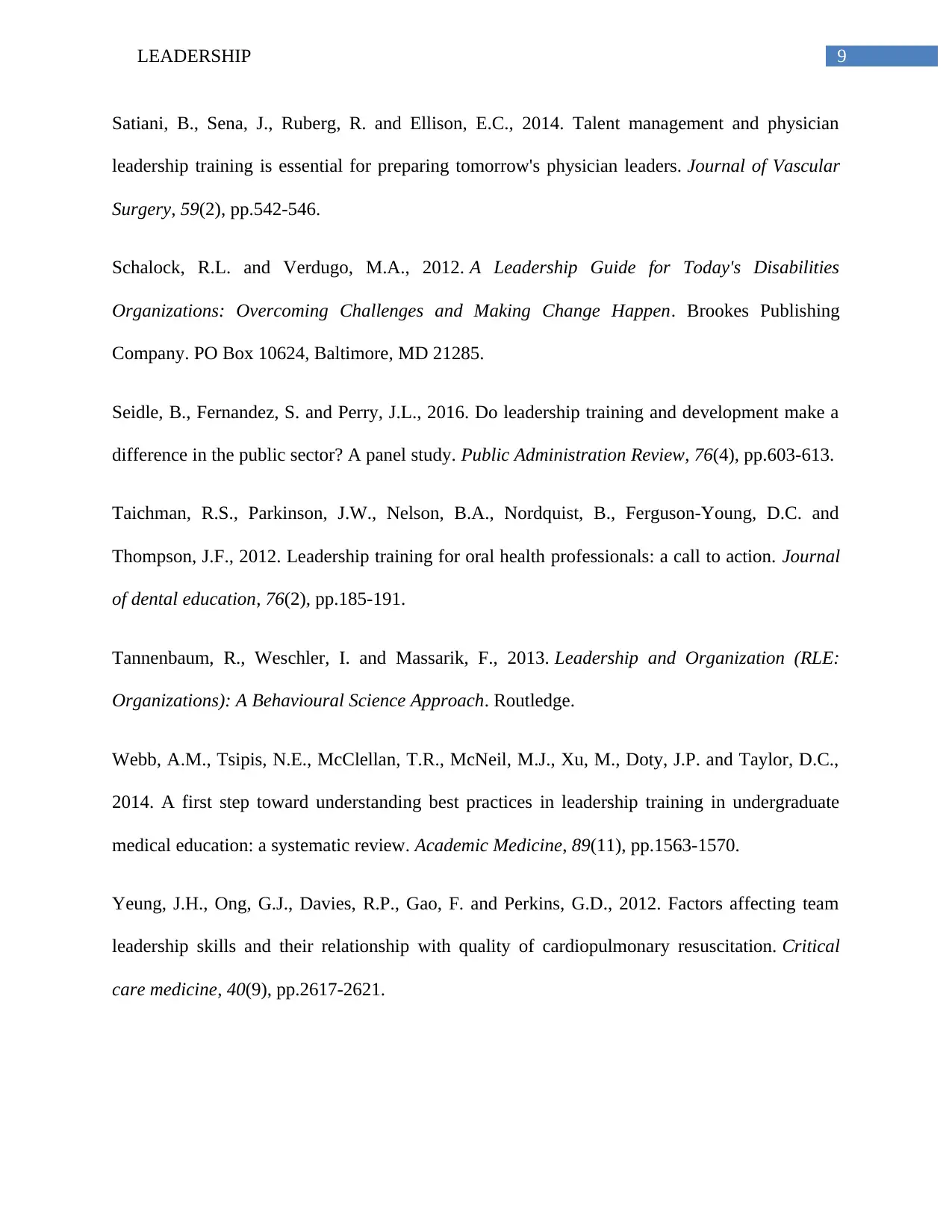
9LEADERSHIP
Satiani, B., Sena, J., Ruberg, R. and Ellison, E.C., 2014. Talent management and physician
leadership training is essential for preparing tomorrow's physician leaders. Journal of Vascular
Surgery, 59(2), pp.542-546.
Schalock, R.L. and Verdugo, M.A., 2012. A Leadership Guide for Today's Disabilities
Organizations: Overcoming Challenges and Making Change Happen. Brookes Publishing
Company. PO Box 10624, Baltimore, MD 21285.
Seidle, B., Fernandez, S. and Perry, J.L., 2016. Do leadership training and development make a
difference in the public sector? A panel study. Public Administration Review, 76(4), pp.603-613.
Taichman, R.S., Parkinson, J.W., Nelson, B.A., Nordquist, B., Ferguson-Young, D.C. and
Thompson, J.F., 2012. Leadership training for oral health professionals: a call to action. Journal
of dental education, 76(2), pp.185-191.
Tannenbaum, R., Weschler, I. and Massarik, F., 2013. Leadership and Organization (RLE:
Organizations): A Behavioural Science Approach. Routledge.
Webb, A.M., Tsipis, N.E., McClellan, T.R., McNeil, M.J., Xu, M., Doty, J.P. and Taylor, D.C.,
2014. A first step toward understanding best practices in leadership training in undergraduate
medical education: a systematic review. Academic Medicine, 89(11), pp.1563-1570.
Yeung, J.H., Ong, G.J., Davies, R.P., Gao, F. and Perkins, G.D., 2012. Factors affecting team
leadership skills and their relationship with quality of cardiopulmonary resuscitation. Critical
care medicine, 40(9), pp.2617-2621.
Satiani, B., Sena, J., Ruberg, R. and Ellison, E.C., 2014. Talent management and physician
leadership training is essential for preparing tomorrow's physician leaders. Journal of Vascular
Surgery, 59(2), pp.542-546.
Schalock, R.L. and Verdugo, M.A., 2012. A Leadership Guide for Today's Disabilities
Organizations: Overcoming Challenges and Making Change Happen. Brookes Publishing
Company. PO Box 10624, Baltimore, MD 21285.
Seidle, B., Fernandez, S. and Perry, J.L., 2016. Do leadership training and development make a
difference in the public sector? A panel study. Public Administration Review, 76(4), pp.603-613.
Taichman, R.S., Parkinson, J.W., Nelson, B.A., Nordquist, B., Ferguson-Young, D.C. and
Thompson, J.F., 2012. Leadership training for oral health professionals: a call to action. Journal
of dental education, 76(2), pp.185-191.
Tannenbaum, R., Weschler, I. and Massarik, F., 2013. Leadership and Organization (RLE:
Organizations): A Behavioural Science Approach. Routledge.
Webb, A.M., Tsipis, N.E., McClellan, T.R., McNeil, M.J., Xu, M., Doty, J.P. and Taylor, D.C.,
2014. A first step toward understanding best practices in leadership training in undergraduate
medical education: a systematic review. Academic Medicine, 89(11), pp.1563-1570.
Yeung, J.H., Ong, G.J., Davies, R.P., Gao, F. and Perkins, G.D., 2012. Factors affecting team
leadership skills and their relationship with quality of cardiopulmonary resuscitation. Critical
care medicine, 40(9), pp.2617-2621.
1 out of 10
Related Documents
Your All-in-One AI-Powered Toolkit for Academic Success.
+13062052269
info@desklib.com
Available 24*7 on WhatsApp / Email
![[object Object]](/_next/static/media/star-bottom.7253800d.svg)
Unlock your academic potential
© 2024 | Zucol Services PVT LTD | All rights reserved.




